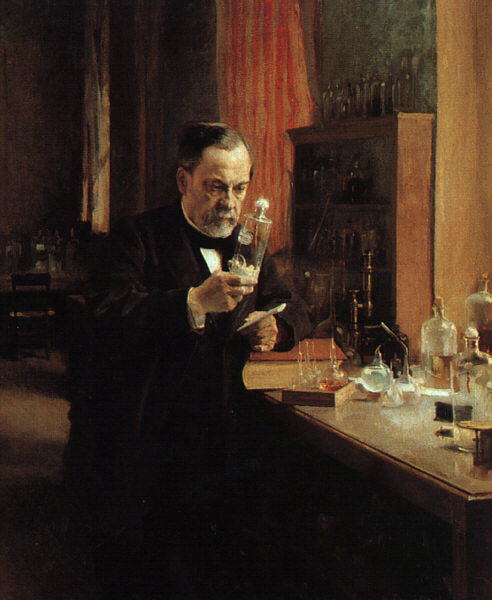*Image Credit: Wikimedia Commons Medical science has experienced countless breakthroughs over the centuries, yet the work of Louis Pasteur and Claude Bernard may have some of the widest effects beyond the discipline: as the result of experiments began on April 20, 1862, the two men came up with a process to prevent the spoilage of milk, wine and beer. Known today as pasteurization, the technique proved a means for redefining how the world looked at germs and their effects. More than 750 years before Pasteur and Bernard, Chinese records laid out a process for bringing wine to a boil in order to prevent it from turning to vinegar. For centuries, people believed the changeover during fermentation to be an issue of chemistry — the molecules in wine breaking down into the molecules for vinegar. By elevating the temperature to a specific point, manufacturers felt they were able to, in essence, “freeze” the composition of the wine at the proper stage to help it retain its flavor. Almost a decade after receiving his PhD from the Ecole Normale Superieure in Paris, Pasteur received a commission from a maker of beet root alcohol in 1856 while working at the University of Lille. The owner had grown tired of seeing entire batches of his product poured out before they could be sold and, knowing the French government’s emphasis on university research being applied to industry, tapped the chemistry professor to determine what it would take to maintain his supplies longer. Pasteur dove into the research, carefully examining beet root juice at each stage of fermentation. As he observed the shift, he noticed a number of spherical organisms floating in the liquid — yeast, the microbe that consumes sugar to transform it into alcohol. Days later, as the juice soured and became unusable, Pasteur looked again and found something quite different: rod-shaped organisms — a bacteria. Going over his results, he came to the conclusion “germs” caused the change, a far-reaching discovery with implications in medicine. Over time, he would go on to prove that microbes exist in the environment, allowing them to invade any host and, potentially, cause illness. (Up until then, scientists believed bacteria and viruses suddenly appeared in an individual.) With his research proved, Pasteur received an appointment from Emperor Napoleon III to apply his knowledge to French wine. A process for heating the liquid was already known — Nicolas Appert invented a canning method which sterilized foodstuffs within a container — but there were no standards set up to preserve the taste of the wine. Working in conjunction with his research assistant Bernard beginning on April 20, 1862, Pasteur came up with exact measurements for temperature and the amount of time necessary. The results were a revelation: wine could last much longer so long as it was not contaminated after being pasteurized. Within months, beer and vinegar were added to the list of materials subject to the process, literally saving vast portions of French agricultural products for export. Years later, Pasteur’s method would be turned to milk. Despite a scalding and straining process for butter dating to the 1770s, no one had opted to use the same technique on other forms of dairy. Through separate approaches of low- and high-heat, pasteurization eliminated tuberculosis bacteria and drastically reduced the number of infections suffered during the early 20th century. Because of Pasteur and Bernard’s work, the illness is no longer listed as a foodborne pathogen by the Centers for Disease Control and Prevention and tens of thousands of life-threatening illnesses are avoided every year. Also On This Day: 1534 – Jacques Cartier leaves France on his way to Asia — discovering Canada and Labrador instead. 1889 – Future Nazi Party leader and German Chancellor Adolf Hitler is born. 1902 – Pierre and Marie Curie refine radium chloride. 1926 – Western Electric and Warner Bros. Studios announce the creation of Vitaphone, a post-production process to add sound to film. 2010 – The Deepwater Horizon oil well explodes in the Gulf of Mexico, spilling 4.9 million barrels of oil.
April 20 1862 – Louis Pasteur and Claude Bernard Begin Tests of Pasteurization
*Image Credit: Wikimedia Commons Medical science has experienced countless breakthroughs over the centuries, yet the work of Louis Pasteur and Claude Bernard may have some of the widest effects beyond…
572
